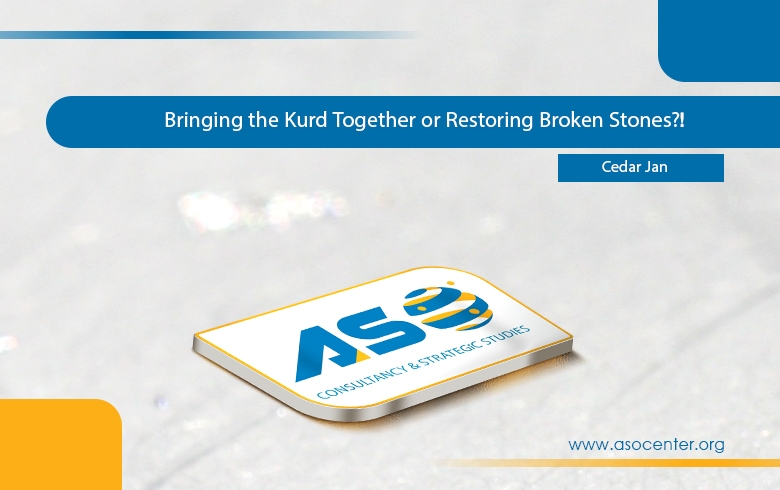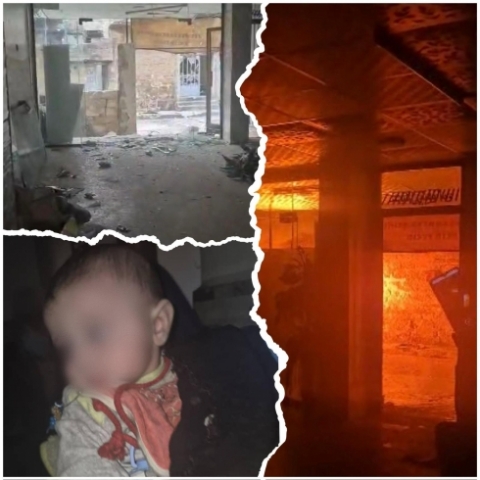

Bringing the Kurd Together or Restoring Broken Stones?!
2020-01-09
Writer: Cedar Jan
The two sides of the Kurdish political equation in Syria, represented by the Kurdish National Council and the Democratic Union Party, take turns to throw the ball to each other's playground after the initiative to bring Kurdish people together, launched by General Mazloum Abdi, the leader of Syrian Democratic Forces, in light of American pressure on both sides along with a Russian desire, support from the Kurdistan region of Iraq and from the president Nechirvan Barzani.
Despite all previous initiatives, the latter one, somehow reveals a true desire to complete itself, and the current political circumstances may indeed be appropriate to reach a partnership between the two opposing parties, especially after the Turkish aggression on the areas east of the Euphrates and the occupation of Ras al-Ain and Tel Abyad, as well as the great international sympathy the Kurdish Syrian people against the Turkish President, Erdogan, for the first time.
Not to mention the impotence for these two authorities to admit their inability to exclude the other in the political process, especially after various media statements declaring that the solution coming soon in Syria.
Throwing the ball to the other's playground doesn’t necessarily indicate that the initiative failed by one party or the other. However, it may be a final pulse before conducting real dialogues that lead to concessions of both parties, in case they want to success.
In a simple language, both of the opposing parties are political, and according to reality and logic, they seek their interests, which is a natural matter to seek, and the "gains" of the Kurds, at the present time, may be agreed upon in the form of joint management, quotas or consensus that satisfies both of them. This can be achieved in the event that confidence-building measures are taken in relation to revealing the fate of the detainees or the enforced disappeared persons, who are 10 people, according to the list announced by the Self-Administration and the Kurdish National Council, in addition to the council taking position from the opposing Syrian coalition at the same time.
However, it is not natural to do this without taking into consideration the will of the people in the east of the Euphrates. Any entity that will be formed, restored or modified again, without the participation of society as a whole cell, will not be able to change anything in the administration's nature nor in its improvement or development, and there is no benefit of it.
The natural questions that come to mind remain the following: There is a general desire for everyone to have an agreement between the two parties, however, what will change? And how will it change? Do we have the mechanisms to actually change and develop what we already have? Will people be allowed to choose their representatives freely, within democratic and educational mechanisms? Who is to be blamed?
Whether a new administration is formed or the current administration is repaired, it would be necessary to encourage voting and ballot boxes, and choose the most qualified of candidates, who will entail giving the voters the freedom to choose their representatives in the administration and the legislative, executive and judicial councils, after drafting a new social contract, where it will popularly be referendum on it.
As for civil and unarmed powers in the east of Euphrates society including institutions, civil organizations, private media outlets, intellectuals unions and women's unions, it is their responsibility to encourage, from the moment, the consolidation of societal awareness about the developments taking place and activate its role in pressuring the formed authority, by its all available means, in all political, social and economic fields. These include the equitable wealth distribution, public budget announcement, the actual practice of democracy's concepts establishment, and raising awareness about the need for real representation and effective community participation within the framework of both public and individual interests, without the public prevailing over individualism in all respects.
It must be pointed out that the national and collective sense of the Kurds in Syria always leads them to the axiomatic of solidarity, unifying ranks and Kurdish discourse, without going into the real and realistic details of what any participatory step between the Kurdish parties in conflict would result in throughout the years of the crisis in Syria, or even without considering the factual reasons for the opposition, as necessary; As knowing the reasons and having the audacity to address them, will certainly result in strong and sustainable solutions. However, patching and ignoring problems will lead to nothing, but only to placing broken stones in corners that do not accommodate them.
I do not believe that there is a single Kurdish person who does not wish to unify the Kurdish ranks and form a single front against everything that is being hatched and harassed the Kurdish issue in Syria, nevertheless, the current phase needs actual construction, defining what usually CSOs call "Problem Tree", and starting implementing projects that lead to well-thought-out results.



